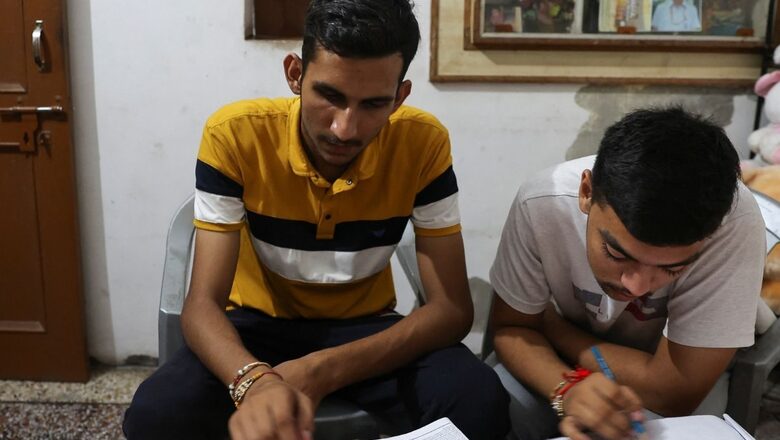
views
With an ever-increasing number of students enrolled in coaching centres ending their lives or battling mental health issues over the past year, the Centre has come up with a legal framework to regulate these institutes across states, which bars them from enrolling those below the age of 16 years, making “misleading claims” about getting ranks or entry to top institutions, as well as mandates classes not to be held for more than five hours a day to avoid “undue stress”. The guidelines were released by the ministry of education (MoE) on Thursday to be implemented by states.
The proposed rules titled Guidelines for Regulation of Coaching Centres 2024 state that no coaching centre shall make “misleading promises or guarantee of rank or good marks” to parents/students for enrolling them. They also bar centres from enrolling students below 16 years of age, or the student enrolment should be only after secondary school examination. Besides, they do not allow coaching centres to be registered unless they have a counselling system as per the requirements of the guidelines.
According to the guidelines, the coaching centres should conduct periodic workshops and sensitisation sessions regarding students’ mental health. “Due to high competition and academic pressure on students, coaching centres should take steps for mental wellbeing of the students and may conduct classes without putting undue pressure on its students. Also, they should establish the mechanism for immediate intervention to provide targeted and sustained assistance to students in distress and stressful situations,” they state.
The ministry’s letter asking states to implement the proposed guidelines says that the number of unregulated private coaching centres in the country continues to grow in the absence of any laid-down policy or regulation. “Instances of such centres charging exorbitant fees from students, undue stress on students resulting in students committing suicides, loss of precious lives due to fire and other accidents, and many other malpractices being adopted by these centres are widely reported in the media…Accordingly, the guidelines have been prepared and are being forwarded for consideration by States/UTs byway of appropriate legal framework,” the letter undersigned by deputy secretary Devendra Kumar Sharma reads.
Since education is a subject in the concurrent list with secondary education largely under the state governments, they have been asked to implement the guidelines through this legal framework.
Some of the coaching centres News18 reached out to for a reaction said they cannot comment without studying the guidelines in detail.
Last year, 26 students preparing for competitive examinations such as JEE and NEET for entry into engineering and medical colleges enrolled in coaching centres at Kota in Rajasthan took their own lives — the highest number of suicides in the district since 2015. Kota is India’s coaching hub for JEE and NEET with the entire city being dotted with coaching centres having lakhs of students enrolled with them from as early as class 9.
The guidelines define a coaching institute as tuition, instructions, or guidance in any branch of learning imparted to more than 50 students. It does not include counselling, sports, dance, theatre, and other creative activities.
A coaching centre shall ensure weekly off for students as well as tutors, the rules say. There shall be no assessment test or exam on the day after the weekly off. Also, the guidelines do not allow centres to conduct classes for more than five hours a day.
According to the new rules, these institutes shall conduct coaching classes in a way that is not excessive for a student. The coaching hours should neither “be too early in the morning nor too late in the evening”.
“During the important and popular festivals in the respective region, coaching institute shall customise leave in such a manner that the students are able to connect with their family and get emotional boosting,” the guidelines state.
Most of these coaching institutes are known for gruelling hours of study without any weekly offs for students or leaves even during festivals. The Kota administration last year came up with a rule for coaching centres to allow weekly off to students and no exam to be conducted on or right after that day when it noticed the number of suicides going up the very next day of the students having written a weekly exam.
The guidelines make it mandatory for coaching institutes to register themselves with the appropriate government authority. “A person shall impart coaching or establish, run, manage or maintain a coaching centre, only with prior registration of such coaching centre as per the provisions of these Guidelines,” they say.
Every registered coaching centre shall apply for renewal of registration certificate to the competent authority. Also, the rules say that the state governments shall create an online mechanism to facilitate the registration of these centres in a faceless manner with minimum human interface.
The proposed rules also bar coaching centres from engaging tutors having qualification less than graduation. No coaching institute shall take part in the publication of any “misleading advertisement relating to any claim, directly or indirectly, of quality of coaching” or the facilities offered therein or the “result procured by such coaching centre or the student who attended such class”, they say.
The guidelines make it clear that no coaching centre can be registered if it has less than the minimum space requirement per student. It mandates a “minimum one square meter area” be allocated for each student during a class or batch. Besides, institutes cannot hire any tutor or person convicted for an offence involving “moral turpitude”.
The rules mandate that a coaching centre shall have a website with updated details of the qualification of tutors, courses/curriculum, duration of completion, hostel facilities (if any), the fees being charged, easy exit policy, fee refund policy, number of students undertaken coaching from them and number of students finally succeeded in getting admission in higher education institutions.
Coaching classes for those students who are also studying in an educational institution such as a school shall not be conducted during their institutions/schools’ hours so that dummy schools can be avoided, the guidelines state.
The guidelines also mandate a refund of fees by the coaching institute within 10 days if the student has paid for the course in full and is leaving in the middle of the prescribed period. If the student is staying in the hostel of the coaching centre, then the hostel fees, mess fee, etc, will also be refunded.
The rules also state that coaching centres shall have a committee for the redressal of grievances of students. The competent authority may take steps to ensure that a counselling system is developed by the coaching centre and is easily available for the students and parents.




















Comments
0 comment